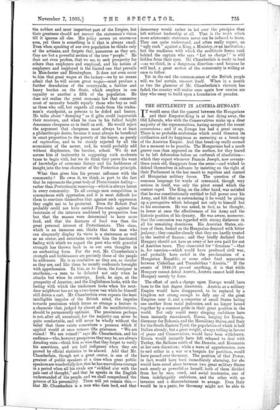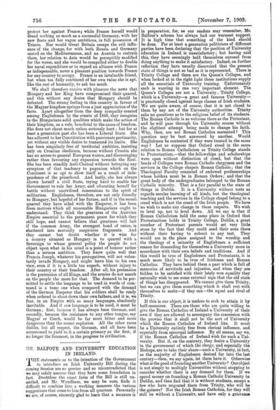THE SETTLEMENT IN AUSTRIA-HUNGARY.
IT would seem that the quarrel between the Hungarians and their Emperor-King is at last dying away, the Old Liberals, who with the Conservatives make up a clear majority of the representatives, having accepted the recent concessions ; and if so, Europe has had a great escape. There is no probable misfortune which could threaten its civilisation and its happiness so menacing as a break-up of the Austrian Empire. And that break-up really seemed for a moment to be possible. The Hungarians had a much graver case than appeared on the surface, for they feared to be left defenceless before an outbreak of absolutism— which they expect whenever Francis Joseph, now seventy- three years old, disappears from the scene—and wished to defend. themselves in advance by insisting on the right of their Parliament in the last resort to regulate and control all Hungarian military forces. The question of the common language for words of command, though very serious in itself, was only the pivot round which the contest raged. The King, on the other hand, was satisfied that he was constitutionally entitled to full power over his Army, and felt that in surrendering it he would be giving up a prerogative which belonged not only to himself but to his successors. He was asked, in fact, as he thought, to lower at once the effectiveness of his Army and the historic position of his dynasty. He was aware, moreover, that the concession was regarded with strong disfavour in all his remaining dominions. His Austrian States, six- teen of them, looked on the Hungarian demand with bitter jealousy; they consider already that they are hardly treated in the matter of finance ; and they loudly declared that Hungary should not have an army of her own paid for out of Austrian taxes. They clamoured for "firmness "—that is, for c,cercion—which would have produced civil war, and probably have ended in the proclamation of a Hungarian Republic, or some other final separation between Cisleithan and Transleithan "Austria." If the events of 1848-50 proved anything, it is that while Hungary cannot defeat Austria, Austria cannot hold down Hungary merely by force.
The effect of such a change upon Europe would have been to the last degree disastrous. Austria as a military Empire would have disappeared, to be replaced by a kingdom not strong enough to defy any of the great Empires near it, and a congeries of small States hating one another from racial jealousies, and no longer bound together by a common pride in their great position in the world. Not only would many sleeping ambitions have been instantly reawakened, Russia longing for Bosnia, Germany for Bohemia and the Hereditary Sates, and Italy for the South-Eastern Tyrol, the population of which is half Italian already, but a great weight, always telling in favour of peace and Conservatism, would have been withdrawn. Russia would instantly have felt released to deal with Turkey, the Balkans south of the Danube, and Roumania at her own discretion ; while a wave of apprehension, sure to end either in a war or a bargain for partition, would have passed over Germany. The position of that Power, in fact, would have been immediately alarming, for she would have stood alone between two great military States each nearly as powerful as herself, both of them divided from her by race, creed, and, social tendencies, one of them indefatigably ambitious, and the other with an invasion and a dismemberment to avenge. Even Italy would be in a panic, for Germany might not be able to protect her against France; while France herself would dread nothing so much as a successful Germany, with her new fleets and her vague ambitions, in full possession of Trieste. Nor would Great Britain escape the evil influ- ence of the change, for with both Russia and Germany seated on the Mediterranean, and no Austria to restrain them, her relation to Asia would be perceptibly modified for the worse, and she would be compelled either to double her naval expenditure or to regard an alliance with France as indispensable, never a pleasant position towards France for any country to occupy. France is an invaluable friend, but when too fully convinced of her own value she is apt, like the rest of humanity, to ask too much.
We shall therefore receive with pleasure the news that Hungary and her King have compromised their quarrel, and this without any desire that Hungary should be defeated. The strong feeling in this country in favour of the Magyar kingdom springs from a just appreciation of the facts. Apart altogether from the deep sympathy created among Englishmen by the events of 1848, they recognise in the Hungarians solid qualities which make the action of their kingdom, as a rule, beneficial to the cause of freedom. She does not shout much unless seriously hurt.; but for at least a generation past she has been a Liberal State. She has adhered to her Constitution with passionate pertinacity, yet without any visible desire to transcend its limits. She has been singularly free of territorial ambition, insisting only on Croatian obedience, because without Croatia she has no access to general European waters, and discouraging rather than favouring any expansion towards the East.
She has been steadily Anti-Clerical without betraying any symptom of that tendency to paganism which on the Continent is so apt to show itself as a result of inde- pendence of the priesthood. And lastly, she has always shown herself a civil State, trying hard to enable her Government to rule her Army, and educating herself for battle without uncivilised concessions to the spirit of militarism. Englishmen, therefore, are not only friendly to Hungary, but hopeful of her future, and if in the recent quarrel they have sided with the Emperor, it has been from motives which all reasonable Hungarians ought to understand. They think the greatness of the Austrian Empire essential to the permanent peace for which they still hope, and cannot believe that greatness will last if the common Army, the strongest bond of union, is shattered into mutually suspicious fragments. And they cannot but doubt whether it is wise for a country situated as Hungary is to quarrel with a Sovereign to whose general policy the people do not object upon what in his mind is a point of honour rather than a serious ambition. They know quite well that Francis Joseph, whatever his prerogatives, will not volun- tarily invade Hungary, and might leave him to his own view, even if it is a little too superb, without injury to their, country or their freedom. After all, his pretension is the pretension of all Kings, and the armies do not march on the people the more for that. The demand to be per- mitted to settle the language to be used in words of com- mand is a tame one when compared with the demand of the German Emperor that his soldiers shall be ready when ordered to shoot down their own fathers, and it is, we fear, in an Empire with so many languages, absolutely inevitable. And if one language is to be used, it must be German ; first, because it has always been German, and secondly, because the resistance to any other tongue, say Magyar or Czech, would be far more bitter and more dangerous than the recent explosion. All the other races dislike, but all respect, the German, and all have been accustomed to yield to it a certain primacy as the first, if no longer the foremost, in the progress to civilisation.































































 Previous page
Previous page